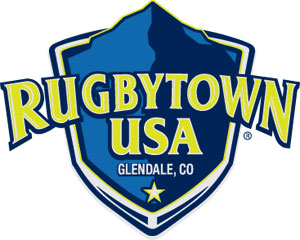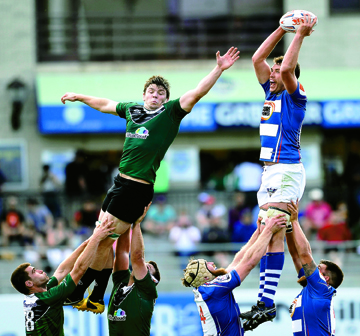by Marco Cummings
Writer for and on behalf of the City of Glendale
The Glendale Raptors fell short of their summertime goals in 2014, falling a game short of Club 7s Nationals with a loss at the Omaha 7s qualifying tournament and falling short of hardware with a loss to the Northeast Olympic Development Academy with a 35-7 loss in the Plate (second tier) Final at the annual Serevi RugbyTown Sevens tournament hosted at Infinity Park.
Yet neither defeat was the biggest blow to the Raptors during a grueling 7s season. The team’s biggest loss was that of longtime team member Casey Rock to injury.
Suffering a blown knee in the Denver 7s tournament which started off the Raptors’ 7s campaign in 2014, Rock was tackled by an injury which not only prompted an early end to his season, but also forced the lock forward into a premature retirement from playing a game he has grown to love.
“I tore my LCL, MCL, ACL, patella tendon, all of my meniscus, and shredded all of the cartilage in my tibia and femur.” Rock said of the gruesome injury. “The doctor told me that because of all the bone damage, contact sports are done for me.”
Ironically, Rock’s injury came not from contact but from an awkward landing while chasing down an opponent.
An injury involving damage to the primary ligaments within the knee is sometimes referred to as an “unhappy triad” in the medical field, and for good reason.
“My spirits are pretty low,” Rock laments. “I wasn’t ready to stop playing and it’s been a real challenge to deal with that premature end to it all.”
At age 27, Rock seemed primed for many more seasons playing with the Raptors in both the 7s and 15s variations of Rugby. But it also ends the long journey he has experienced alongside the club, having joined the Raptors as one of the team’s original members back in 2006.
A Colorado native, Rock played both soccer and rugby at Denver’s East High School. In college, he focused on soccer with a scholarship to Metro State, but was lured back to Rugby when the Raptors began recruiting players at the club’s inception.
“I always thought that soccer players made a better transition to rugby because you’re used to running around for 90 minutes,” Rock explained. “You’re used to the game’s flow because soccer has so much change of direction and constant movement.”
His time with the Raptors eventually led to additional opportunities within the sport, including stints abroad with clubs in Australia and New Zealand as well as stints with the Collegiate All-Americans and USA Eagles. But his fondest memories remain with the Raptors.
“Winning the National Championship in 2011 was really fun,” Rock recalls. “We had a great team of guys that year. We had guys who weren’t necessarily stars but it was a great team.”
Rock continued his path to become a better rugby player while the Raptors became a bigger and better club.
“It’s been fascinating to watch the club grow. From being a 19-year-old practicing behind the Goodwill to playing for a Springbok legend in one of the greatest facilities in the Nation has been really great,” Rock said.
The “Springbok legend” Rock refers to is current head coach Andre Snyman. While Rock has only spent a few seasons under the South African, Rock explained that Snyman’s experience, particularly in the 7s game, had helped him become a more complete player.
“His knowledge of the game is so vast,” Rock said. “He’s really helped me develop my ball handling skills and vision for the game. I learned how to look at the game differently with him and see how the game was developing to put myself in a better place on the field.”
But even though Casey Rock’s time on the field has come to an end, he assures that he will continue to maintain a role with the Raptors and a relationship with the sport of Rugby.
Shortly after his injury, Rock was offered the position as coach of the Raptors Division II forwards. He’s also spearheading the movement to create an “Old Boys” organization for the Raptors. Not often seen with rugby clubs in the United States, an Old Boys organization is a way for former players to give back time and resources to their former club.
“Having played overseas, I’ve been part of clubs that have been around for hundreds of years. When guys retire they don’t just disappear. They tailgate or run a training session for the younger players. I see myself bringing the boys back in an organized fashion and being more visible,” Rock explained. “I feel really proud and humbled at how much the club still wants me around and to be involved.”
Outside of rugby, Rock has also gained time to focus himself on his new career as a first year language arts teacher for middle school students.
Unfortunately, no lesson plan could have prepared him for the challenges he has faced this summer while dealing with the devastating knee injury.
“The lesson I’ve learned is that all good things come to an end. It’s put some things in perspective for me. It’s reinforced the belief that you can’t spend all your time and energy on one thing.”


